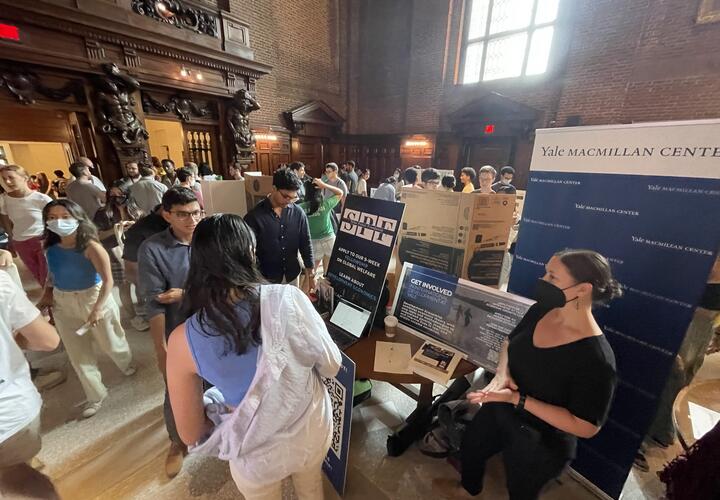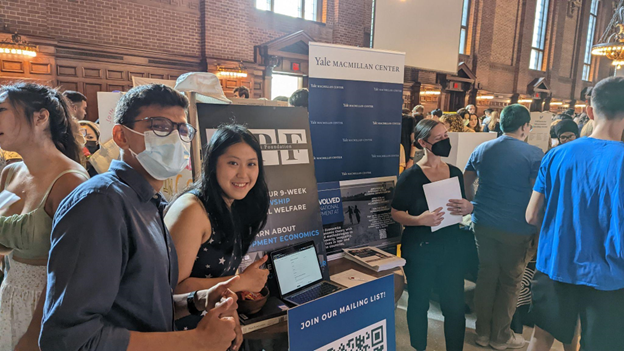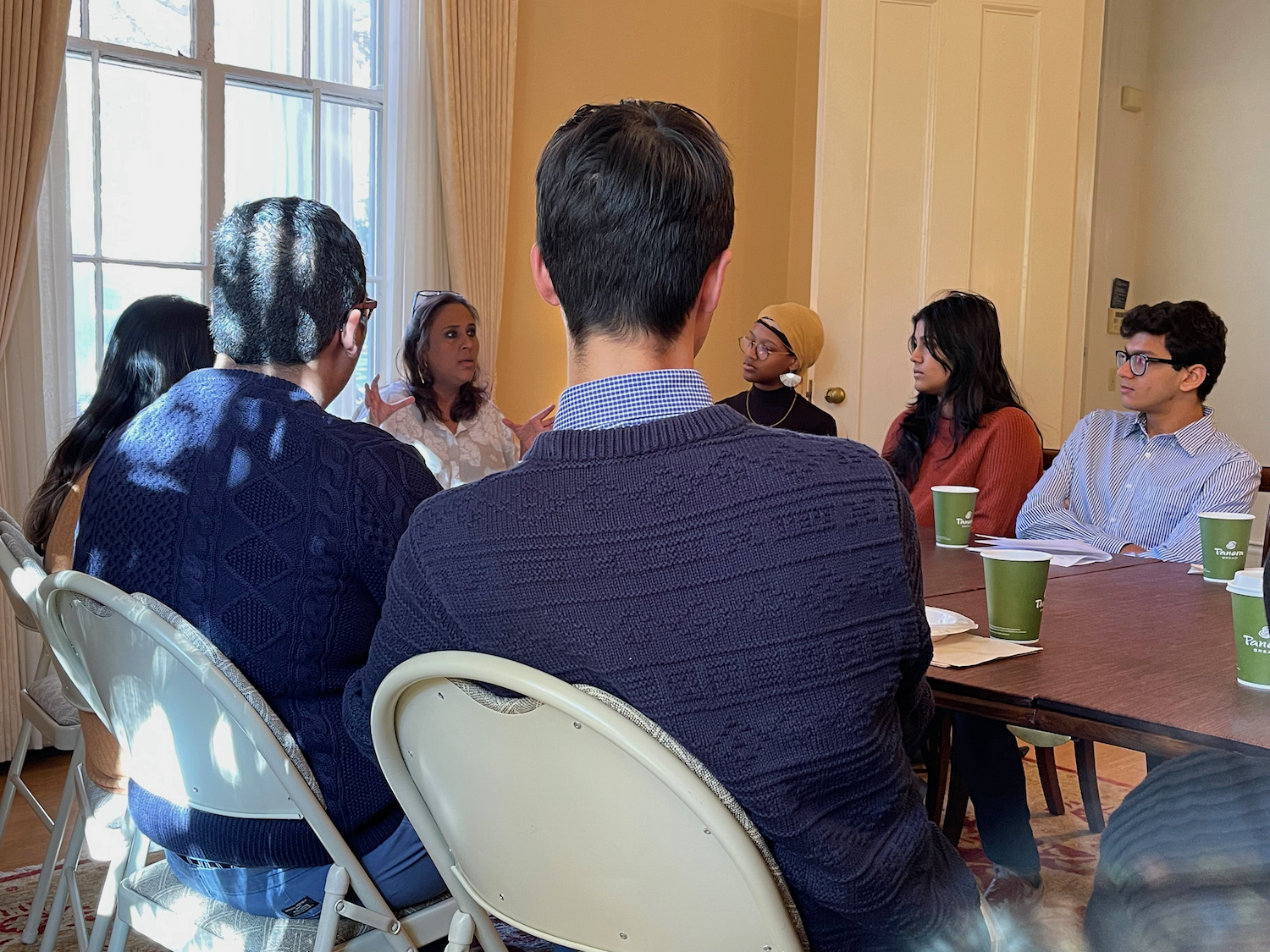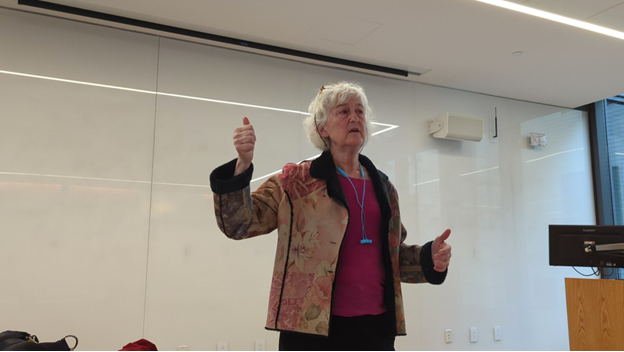Student leaders look back on the inaugural year of an international development club
With support from the Economic Growth Center, Yale undergraduates established Salus Populi Foundation to promote development economics on campus. Here, Daevan Mangalmurti and Bilal Moin reflect on a year of curriculum development, events, and growth.

Economics has been the most popular major at Yale for more than a decade: in Fall 2022, one in ten Yale undergraduates was majoring in Econ. The university's expertise in the field is comprehensive, spanning everything from corporate finance to domestic policy and international development – the last of which is exemplified by the storied legacy of Economic Growth Center. But few Yale undergraduates studying economics go into development. Many pursue careers in banking, private equity, and management consulting. The allure of these paths is burnished by ubiquitous campus recruiters and the promise of lucrative salaries, and there are fewer visible guides to careers in economic development. That is a problem for a world with a pressing need for talented development thinkers.
In our first two years at Yale, we observed widespread interest in development but few pathways and mentors for pursuing those interests. Looking around campus, we also saw a plethora of clubs devoted to facilitating students’ interests in areas like finance and consulting. Why not create a student organization that could do the same for development? During the summer of 2022, five current Yale College juniors – the two of us, Bilal Moin and Daevan Mangalmurti, along with Jean Wang, Braden Wong, and Aryan Sehgal – devised a blueprint for a new organization. Our president, Bilal, who studies Economics, Mathematics and Global Affairs, gained experience as an intern at the EGC during his freshman summer.
We christened the new organization the Salus Populi Foundation (SPF). The name came from a maxim attributed to Cicero, the Roman statesman and philosopher: salus populi suprema lex esto, which translates to “the welfare of the people should be the supreme law.” The concept of “Salus Populi” encapsulates our aspirations: to encourage students with an interest in economics and development to explore their passions and to convince them of the profound fulfillment inherent in working on projects that can improve the lives of others at scale.

Introducing SPF to the world at the Fall Extracurricular Bazaar, September, 2023
We decided on three pillars of the program: a fellowship program to introduce first-years to the principles of international development, a year-long speaker series to bring in prominent thinkers in development, and a long-term effort to make research and internship opportunities more widely known among the student body. We sent countless cold emails to economists around the globe, compiled extensive lists of opportunities in the field, and sought support from EGC. With the advice of J Stallman, an Economics PhD candidate whose detailed feedback both demolished our plans and built them back up, we designed a 13-week fellowship curriculum that we would run for the first time during the fall of 2022.
Our year began with a booth at the fall Extracurricular Bazaar. Going in, we had anticipated 40 or so students expressing interest in our group. We ended up with 165 people signing up for the SPF newsletter. As we had hoped, there were students interested in learning more about development economics.
Our first task was getting first-years who might have a tentative interest in the field firmly hooked. We selected 10 students for our inaugural fellowship via a competitive application. Over the course of 13 weeks, we went over the ethics of international aid, analyzed the flaws of randomized controlled trials, and questioned the premise of endless growth. We were grateful to have EGC’s support throughout the process. They facilitated visits like that of Dr. Antonella Bancalari, a Fulbright Visiting Scholar, who discussed her work on infrastructure and development in Peru with our fellowship class in October. That month, SPF fellows were also invited by South Asian Studies Council to participate in a small lunch with Ramachandra Guha, the acclaimed Indian historian.
In November, EGC invited the fellows to a breakfast-and-learn with Barkha Dutt, a renowned Indian journalist. We welcomed Harvard Assistant Professor Jie Bai – who visited EGC as part of the Kuznets Visitors Program – for a small-group discussion on the microeconomics of firms in developing countries.

Breakfast with Barkha Dutt, renowned Indian journalist.
In December, Kyriacos Koupparis, a World Fellow at the Jackson School of Global Affairs, spoke to SPF about his role at the UN World Food Programme. At the end of the 13 weeks, the fellows did brief presentations on strategies for addressing a problem of their choice through the lens of development economics. The presentations served as capstones on the fellowship experience and dealt with a range of topics from corruption in Pakistan, to the economic crisis in Venezuela, to mass incarceration in the United States. Perhaps the best moment of the year was seeing on our end-of-semester feedback form that every one of the fellows said that if given the chance they would recommend the fellowship to Yale first-years.
Even as we were running the fellowship program, we began to hold speaker events open to all Yale students. Our first event was a Zoom lecture with Professor Justin Yifu Lin, former Chief Economist of the World Bank and the most prominent advocate of New Structural Economics. Professor Lin delivered the Kuznets Lecture in 2009.
Entering the spring semester, we dedicated ourselves to bringing a variety of perspectives on economic development to Yale (see all SPF speaker events here). Our first speaker of the semester was Professor Jayati Ghosh who joined us on Zoom for an incredible Q&A on climate and gender economics that addressed the structural inequalities permitting unsustainable exploitation. In February, we were joined by Professor Ha-Joon Chang, the prolific development economist. Professor Chang took the time on a trip to the United States to visit us in New Haven for a lecture on his new book Edible Economics: A Hungry Economist Explains the World. The lecture, which mixed key ideas of macroeconomic development with uproarious anecdotes about Chang’s experiences with food around the world, was intimate yet accessible.
In February and March, we heard from Dr. K.V. Subramanian, the former Chief Economic Advisor to the Government of India and Professor Seema Jayachandran who offered perspectives on a range of questions on inequality, growth, and the environment. Our last speaker of the semester was Professor Nancy Folbre, whose engaging seminar at the newly inaugurated Tobin Center on “Accounting for Care” capped off a fascinating series of speaker events and marked the end of a busy and exciting year of growth.

Professor Nancy Folbre speaking on ‘Accounting for Care’
This April, we completed our selection process for the new SPF board. Several of the new board members went through our fellowship program. We are tremendously excited to see where they lead SPF, and how they improve on what we’ve achieved this year. Some of our projects for the upcoming year include furthering a proposal for a Certificate in Development Studies at Yale College (which Bilal proposed in an opinion article for the Yale Daily News published this year), facilitating outreach programs to foster discussions around development on campus, and expanding access to internships in development (which we began this year with an internship panel in March). Above all, as we continue our journey, we remain inspired by our founding principle: salus populi suprema lex esto. We believe that economics, when paired with this ethos, can become a powerful tool for positive change. By encouraging the exploration of international development, we hope to inspire more Yale undergraduates to choose career paths that prioritize the betterment of society, helping to bring about a more equitable and prosperous world.